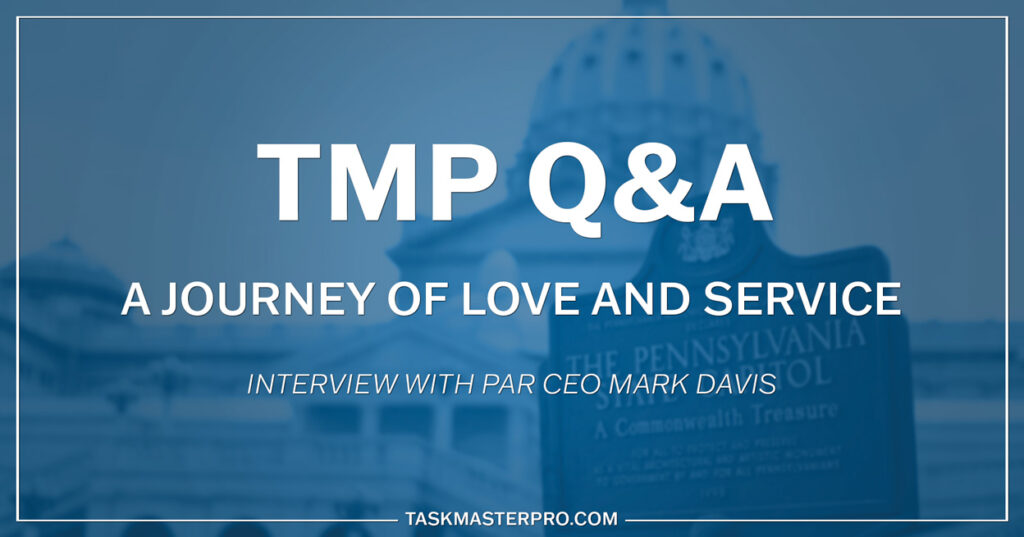Mark Davis, CEO of Pennsylvania Advocacy and Resources (PAR), has dedicated his life to advocating for individuals with disabilities. Starting his journey as a teenager, Mark’s early experiences shaped his lifelong commitment to this field. In this interview, Mark shares insights into his background, his motivation for continuing his work, and the pivotal role of PAR. The conversation delves into the challenges faced by Pennsylvania providers, the organization’s key initiatives like the Sustainability Project, and the importance of data-driven approaches in transitioning to value-based care. Additionally, Mark discusses his collaboration with the American Network of Community Options and Resources (ANCOR) to impact services on a national level.
TMP: Tell me about your background. I know you’ve been in and around the space for a long time. What led you to where you are now?
I go way back. When I was 14 years old in 1974, my mother, who was the volunteer head leader of the Lake River Girl Scout Council, asked me to help her with the Easter Seals Camp. My job was to assist kids with disabilities in learning how to swim as a water safety instructor. I had no formal training, but I took on the challenge.
One memorable experience involved helping a boy named Tony. Without any proper introduction or guidance, I found myself in a life-threatening situation where Tony almost drowned. This incident was a turning point for me. It was the moment I realized that working with people with disabilities was in my heart and blood. Despite my career weaving in and out of different fields over the last 20-30 years, I never forgot that experience.
My background includes an undergraduate and a master’s degree in education and counseling. I interned at Hiram College and General Motors, intending to become an industrial counselor, but my path led me to human services and behavioral health care. I started and ran companies, worked in managed care, and eventually focused on provider-influenced and provider-led services for people with disabilities.
TMP: What motivated you to continue working in this field?
It’s been a journey of love and service. My personal mission has been to ensure that people with disabilities have every opportunity in life that you and I have. It’s simple but challenging. Twenty-two years ago, I had several career options. After deep thought and consultation with trusted mentors and my wife, I chose to work for a trade association because it allowed me to leverage my gifts and talents to impact many lives. I saw it as a calling to touch the lives of 60,000 people with intellectual disabilities.
The opportunity to influence and improve the lives of people with disabilities has been equally rewarding and frustratingly slow. Through my work with various organizations, including PAR (Pennsylvania Advocacy and Resources for Autism and Intellectual Disability) and ANCOR (American Network of Community Options and Resources), I’ve been fortunate to be able to help those organizations work toward making a significant impact.
TMP: Tell me about PAR – the organization you serve. How long has it been around, and what is its goal?
PAR has been around since 1970. We are the largest organization in Pennsylvania focused on providing services for people with intellectual disabilities and autism. Our key services include advocacy, training, education, consultation, and networking opportunities.
We are known for our political advocacy, working with the governor’s administration and the legislature at the state and federal levels. We also provide state-of-the-art training and best practices through our training arm, PARedu. Additionally, we offer consultation services and networking opportunities through various committees and member services.
TMP: What specific issues are Pennsylvania providers facing right now?
The issues we face are similar to those nationwide. Workforce shortages are a significant challenge, and most providers struggle with waiting lists and are unable to serve everyone in need. We’re also grappling with how to effectively use technology and create sustainable systems.
One of our major initiatives is the Sustainability Project, which aims to transition from the current fee-for-service model to more value-based, risk-sharing arrangements. We’ve been working on this since around 2012 and continue to refine our approach based on feedback from various stakeholders.
TMP: Can you share some opportunities for PAR to continue impacting the future?
Our focus is on system reform. The current fee-for-service model is unsustainable, and we need to move towards value-based care and risk-sharing models. The Sustainability Project is central to this effort. We’ve developed a framework for several possible pilot programs and continue to gather feedback to ensure these changes are feasible and beneficial.
Additionally, the state is moving towards performance-based contracting, which will require careful implementation to ensure it truly bridges to a more sustainable future rather than just being another fee-for-service system.
TMP: What role do EHRs (Electronic Health Records) and software play in this transition?
EHRs and data-driven approaches are crucial for the future. Organizations that are more data-literate and able to use EHRs effectively will have a significant advantage. However, this transition will take time to happen. It’s a big shift, and some providers still rely on manual processes.
The goal is to move from process-focused to data-informed decision-making, ultimately leading to value-based, evidence-based practices that improve outcomes. Our efforts with the Center for Disability Information and other initiatives aim to push the use of data to inform policy and practice and thereby improve the lives of people with disabilities.
TMP: Moving from rigid processes to an outcome-based service model is the way of progress in this space. When do you see that coming to fruition?
It will take time. While we can gather data on service costs, we currently lack systems to monitor and define outcomes for people with intellectual disabilities or autism. The relatively small size of our population, coupled with the high degree of variability in need, makes standardizing outcomes challenging.
However, it’s essential to move towards more flexible, outcome-focused services. Plans should be dynamic, reflecting the changing needs and desires of individuals. The shift towards outcome-based models will involve significant changes in how we monitor, define, and achieve these outcomes.
TMP: Tell me about your work with ANCOR and how your mission in Pennsylvania translates to the national association level.
I co-chair the ANCOR Alternative Payment Model Group with Kathy Carmody from Illinois. One of our goals is to focus on outcomes that matter to the individuals we serve, rather than just meeting state-imposed requirements. We aim to provide people with the dignity and autonomy to shape their futures according to their values while aiding in the viability of providers.
Through ANCOR, we collaborate with other states, sharing best practices and working towards common goals. The partnership with ANCOR allows us to leverage our efforts in Pennsylvania to share a broader national impact with our colleagues.
Mark Davis’s journey is a testament to the power of love and service in making a difference in the lives of people with disabilities. His dedication to advocacy, system reform, and data-driven approaches continue to shape the future of services for individuals with intellectual disabilities and autism.

